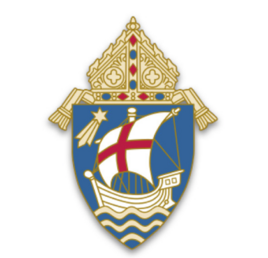-
The Process of Becoming a Deacon
Pursuing the Call
Like all vocations, a call to the diaconate emerges out of both faith and life. Experience is key to the discernment of a diaconal vocation. Contrary to popular belief, a vocation to the sacrament of orders does not typically come crashing out of the sky one day unexpectedly.Because permanent deacons are members of the clergy who by-and-large live lay lives, thediaconate is a unique vocation. Diaconal ministry is something of a bridge between the laity and priests as well as between the laity and their Bishop. The diaconate also connects the Church to the world in a unique way.Inquiry
For anyone interested in the diaconate, it begins with an inquiry. The inquiry can be made byletter, email, or even by telephone. It is as simple as stating you are interested in becoming adeacon and the formation office receiving your contact and some other key information fromyou.Every few years, the Office of Deacons holds Inquiry sessions for those interested in the diaconate. For those who are married, your spouse needs to attend the Inquiry session with you. During the Inquiry session, there are a few presentations about the diaconate, the opportunity to ask questions, and breakout groups for prospective candidates as well as for their spouses.Initial Selection
Eligibility forms are distributed at each Inquiry session. For those who are interested in furtherdiscerning a vocation to the diaconate, it is necessary to complete the eligibility form and return it to the Office of Deacons by the specified date.A complete application is sent to those who return eligibility forms and are deemed eligible.Once received, it is important for those deemed eligible and still interested in pursuing a diaconal vocation to return a completed application with the supporting documents by the specified date.At this point, the Admission & Scrutiny Committee meets to review application packages andselect those applicants deemed eligible and qualified to move to the next phase.
The next phase of the process is undergoing a psychological evaluation. For those who aremarried, this includes an assessment of the relative strength of their marriage. Once this phase is completed, the Admission & Scrutiny Committee meets to select those who will beginAspirancy.Aspirancy
Aspirancy is the two years of diaconal formation. Aspirancy is a time of more intensive discernment both on the part of the aspirant, his spouse (if married), and the local Church. No one is called to ordained ministry unless called by the Church. For those who desire to become deacons in the Diocese of Salt Lake City, the Bishop issues the call.“The aspirant path,” as the USCCB National Directory for the Formation, Ministry, and Life of Permanent Deacons states, “is primarily a time to discern the capability and readiness of an aspirant to be nominated to the diocesan Bishop for acceptance as a candidate for diaconal ordination” (sec. 182).Just as acceptance as a candidate for ordination is not a guarantee of ordination, acceptance as an aspirant does not ensure acceptance as a candidate.Candidacy
Those aspirants who are nominated for Candidacy to the Bishop attend a mandatory retreat during which they write to the Bishop formally requesting to be accepted as a candidate. If married, the aspirant's spouse, who also attends the retreat, writes to the Bishop concurring with her spouse’s request. Aspirants whose nominations are accepted by the Bishop formally become candidates through the Rite of Candidacy.Typically, candidacy lasts around three-and-a-half years. This period of diaconal formation includes many hours of classroom instruction across a broad range of subjects. Outside the classroom, it also includes spiritual direction, mentorship by another deacon or deacon couple, and gaining supervised and assessed pastoral experience. It is a time when the two-way discernment process continues. Progress of candidates is assessed year-to-year or even more frequently.Minor Orders & Ordination
During the latter part of the second year of Candidacy, those approved by the Bishop are instituted into the minor order of Lector. Typically, the minor order of Acolyte is received, after the Bishop’s approval, in the middle of the third year. These minor orders focus on the ministries of word and liturgy respectively.During another required retreat, the Candidate writes to the Bishop asking to be ordained and the wife of the married candidate writes to the Bishop expressing her approval of her spouse's request for ordination. If the Bishop approves the request, diaconal ordination, the admission to the sacrament of orders, occurs.
